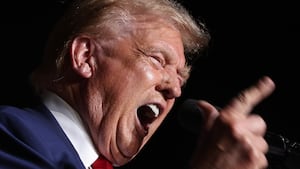Top U.S. officials mistakenly texted war plans to one of the president’s most-hated journalists, The Atlantic revealed Monday—a shocking oversight by those in Donald Trump’s administration.
The bombshell report showed screenshots of a lengthy thread on the messaging app Signal, which included should-be-clandestine texts from Vice President JD Vance, Defense Secretary Pete Hegseth, Chief of Staff Susie Wiles, and others.
Those messages were about the logistics of—and apparent need for—a military strike on Houthi targets in Yemen on March 15. That strike, to “send a message” and to help clear Middle East shipping lanes, was ultimately carried out and killed 53 people.
The messages, which a White House National Security Council spokesperson said Monday appeared to be “authentic,” gave unprecedented insight into how the Trump Administration communicates behind closed doors.
Among the dozens of texts viewed by The Atlantic’s editor-in-chief, Jeffrey Goldberg, included Vance expressing reservations with the strike requested by Trump—a break from the VP’s unwavering public backing of seemingly all of the president’s decisions.

“Team, I am out for the day doing an economic event in Michigan. But I think we are making a mistake,” an account named JD Vance wrote of the strike. He later added his opposition was in part because “I just hate bailing Europe out again.”
A Vance spokesperson did not deny the exchange in a statement to The Atlantic on Monday. That statement also said there is no bad blood between the VP and Trump.
“Vice President Vance unequivocally supports this administration’s foreign policy,” the spokesperson told the magazine. “The President and the Vice President have had subsequent conversations about this matter and are in complete agreement.”
Goldberg, 59, has been the butt of repeated Trump insults—like being called a “horrible, radical-left lunatic” last summer and a “sleazebag” in the fall—after he broke a number of unsavory stories about the president, like his infamous “suckers and losers” line about dead U.S. soldiers from 2020.
Goldberg said it is unclear how—or why—he was added to a text thread filled with top Trump officials. He said he initially feared the messages were part of a “nefarious” attempt to trick him into reporting something untrue that would embarrass him, his magazine, and the mainstream media as a whole.
Goldberg claimed he was added to the chat by an account with the same name as Trump’s national security adviser, Michael Waltz, on March 11. He wrote he received “a connection request” and accepted it, wary it may be part of a ploy against him.

The messages that followed—as well as the parlance and tone used—made Goldberg start to feel he may have truly been added to an exclusive group chat of top Trump officials, he said.
His gut feeling was confirmed on March 15. Just like the messages had laid out, there was a U.S. attack in Yemen. Goldberg wrote that he watched the scene unfold from the parking lot of a grocery store—first by seeing reports of explosions on social media, and then by reading celebratory texts in the Signal chat.
Goldberg reported that Waltz’s account messaged that the military had done an “amazing job,” suggesting the strike was a success. Waltz’s account also reacted with a trio of celebratory emojis—a fist, an American flag, and fire. Goldberg described the group’s full reaction to the news as follows:
I went back to the Signal channel. At 1:48, “Michael Waltz” had provided the group an update. Again, I won’t quote from this text, except to note that he described the operation as an “amazing job.” A few minutes later, “John Ratcliffe” wrote, “A good start.” Not long after, Waltz responded with three emoji: a fist, an American flag, and fire. Others soon joined in, including “MAR,” who wrote, “Good Job Pete and your team!!,” and “Susie Wiles,” who texted, “Kudos to all – most particularly those in theater and CENTCOM! Really great. God bless.” “Steve Witkoff” responded with five emoji: two hands-praying, a flexed bicep, and two American flags. “TG” responded, “Great work and effects!” The after-action discussion included assessments of damage done, including the likely death of a specific individual. The Houthi-run Yemeni health ministry reported that at least 53 people were killed in the strikes, a number that has not been independently verified.
Now with hard proof the chat was likely genuine, Goldberg said he removed himself from it. This, he said, would send a notification to Waltz that he had left the chat.
“No one in the chat had seemed to notice that I was there,” Goldberg wrote. “And I received no subsequent questions about why I left—or, more to the point, who I was.”
Goldberg began messaging those from the group and asking why—or how, if it were a mistake—he was included in important discussions about a military operation. Brian Hughes, a spokesman for the National Security Council, ignored most of Goldberg’s questions but confirmed he had been added by mistake.
“This appears to be an authentic message chain, and we are reviewing how an inadvertent number was added to the chain,” Hughes told The Atlantic. “The thread is a demonstration of the deep and thoughtful policy coordination between senior officials. The ongoing success of the Houthi operation demonstrates that there were no threats to troops or national security.”
Goldberg said he has “never seen a breach quite like this.”
The president claimed he had just heard of the report from a reporter on Monday afternoon.
“I don’t know anything about it,” Trump said, according to CNN. “I’m not a big fan of The Atlantic. To me, it’s a magazine that’s going out of business... You’re telling me about it for the first time.”






